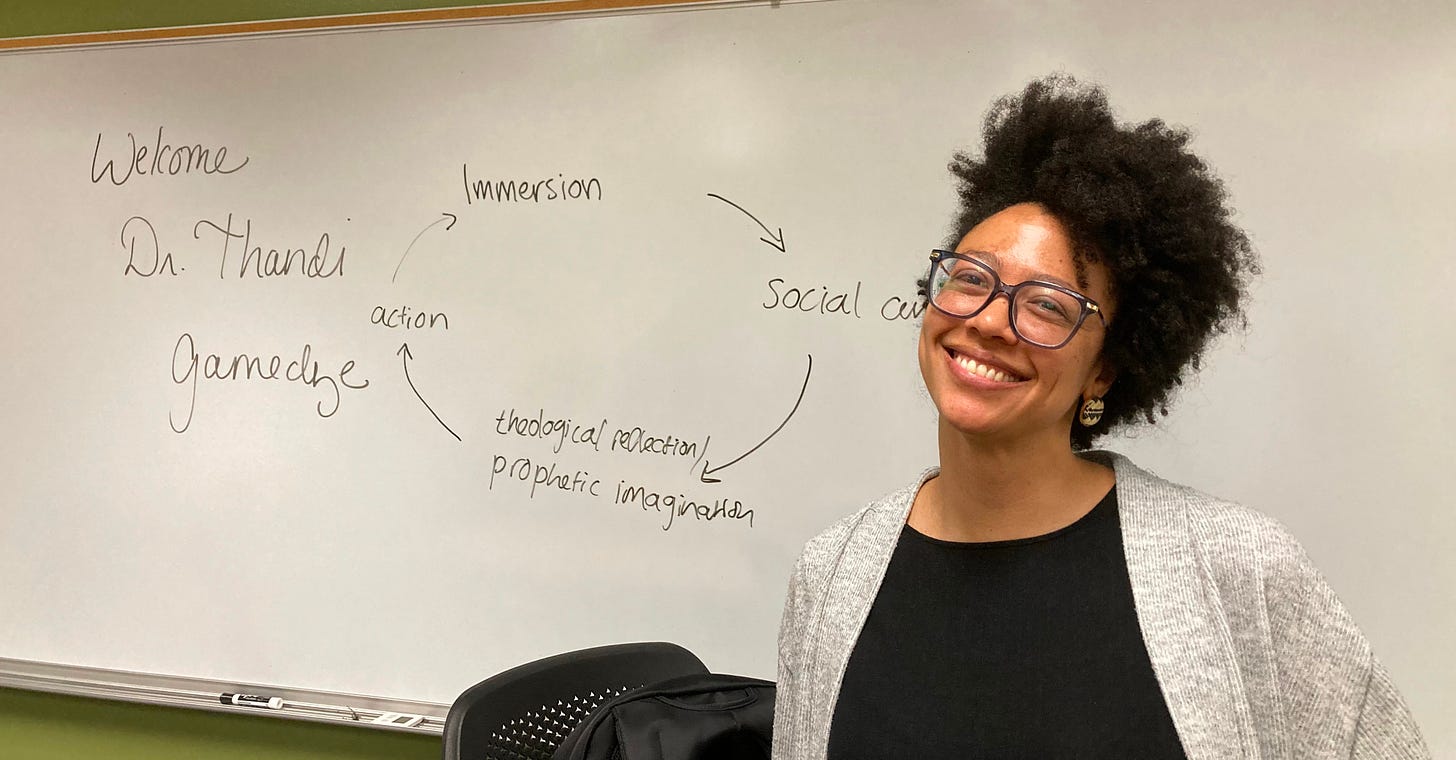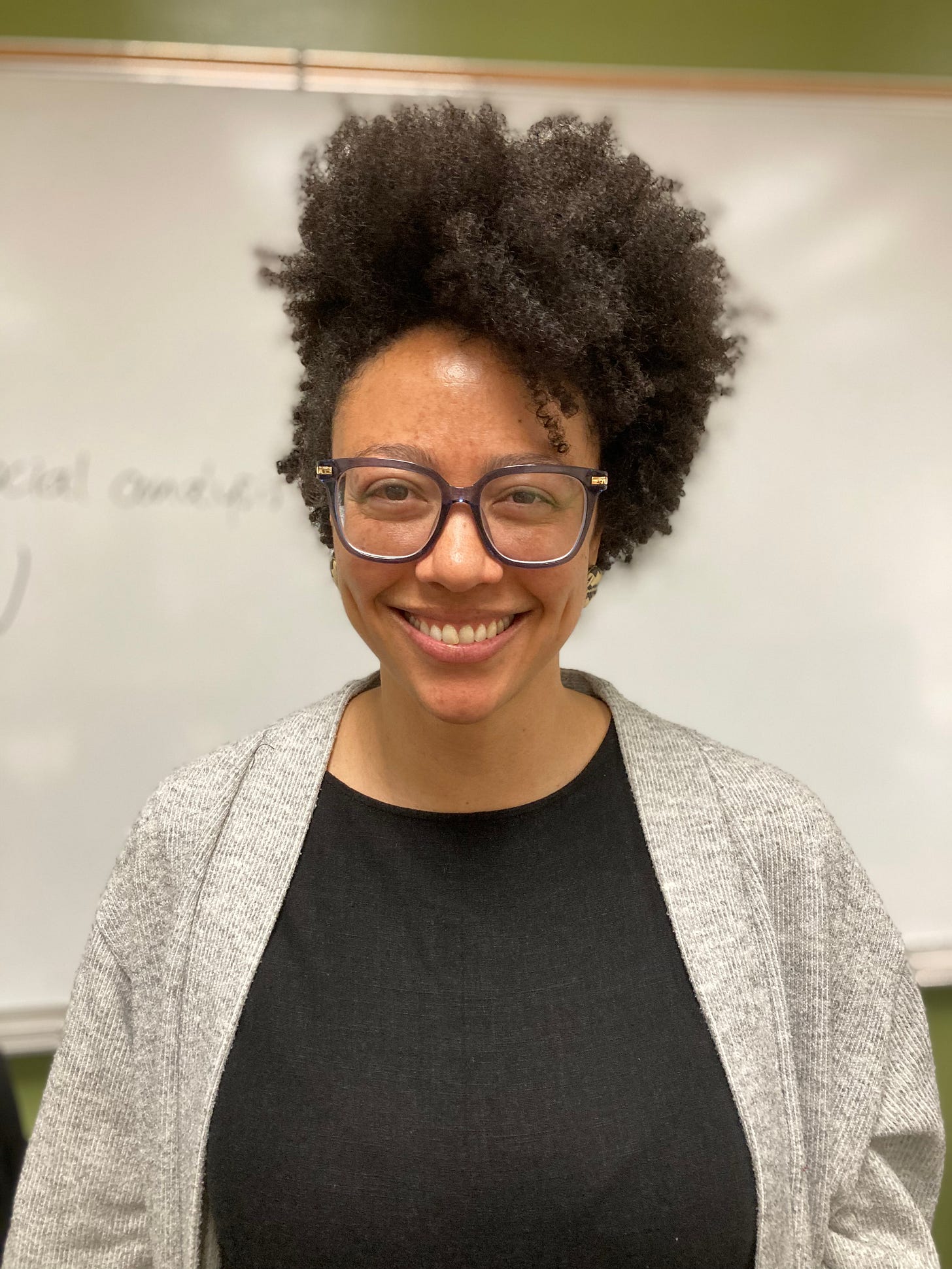Today I’m thinking about how people move from the fleeting sense that something in the world sucks, to knowing precisely what sucks, and then to doing something—maybe even something that works—to fix that suckitude.
Last week I had the good fortune to be in the room while a brilliant South African scholar named Dr. Thandi Gamedze explained how to do that. She did so, no less, while mixing in a generous heaping of her own poetry.
Gamedze works with the Desmond Tutu Research Centre for Religion and Social Justice and also with an organization that equips high school students to make change in their schools and communities. In other words, she talks the talk and also walks the walk. I met her as she visited Wheaton College last week for an annual symposium on Human Needs and Global Resources. Here she is talking to my students:
Notice the drawing on the board. This is what I’m excited to share with you—a process called the “praxis cycle” used to notice and change what needs changing. Here’s how it works.
The process starts with immersion. You get together whatever friends or strangers you can muster and spend time within a community or institution paying attention. Maybe you walk through a neighborhood taking notes or recording voice memos. Maybe you list all the folks who know something about this topic and take them each out for coffee. Maybe you sit in on somebody else’s meetings or scroll through websites. The point is you gather information—especially the sort of information held by people who live their everyday lives most affected by the suckitude.
Next you slow down and do some social analysis. Notice you don’t just dive into the first action step you find. Bring together a wise and diverse team together at a table and start organizing all those notes you’ve gathered into categories. Get a white board and draw a lot of arrows and circles until you see some patterns. It helps to pull in ideas from sociologists and other experts who have studied similar issues, like Matthew Desmond on poverty or George Lipsitz on urban design or Devah Pager on race and incarceration. Dig until you’re able to distinguish between the symptoms and the root causes. Aim for the roots.
Next comes a step with the beautiful title prophetic imagination. I was instantly a fan of Gamedze when I realized how many heroes we share, like Paolo Freire, the Brazilian scholar whose idea this four-step process is based on, and Walter Brueggemann, whose book The Prophetic Imagination should go straight to the top of your reading list. Prophetic imagination is necessary because, as Gamedze put it, “the design of a city is the concretization of the theology of that place.”
Prophetic imagination means looking at the character of God—or at your best understanding of Goodness—and proposing alternative futures in line with that. It’s a way of thinking about theology not just as a story about how to save your individual soul, but as God’s invitation to change the material conditions of our lives. The task of prophetic imagination, Brueggemann writes, is to “bring to public expression those very hopes and yearnings that have been denied so long and suppressed so deeply that we no longer know they are there.” In Gamedze’s conversation with my students, she put it this way:
“Unless we have a vision and imagination of the world we’re trying to create, we can only go so far.”
Now, finally, comes action. All this gathering, analyzing, and squaring it up with the imagination of a good universe should lead to some plans. Don’t limit yourself to the short term. Think about short, medium, and long term goals—what Gamedze called “the one hundred years view.”
Activists, Gamedze reminded us, are not just the influencer people you “like” on social media. All of us shape our social worlds in big and small ways, and all of us can choose to do so more actively.
“Often we take things like borders for granted,” Gamedze said. “But of course borders and all these things were created, and people therefore can change things.”
After you’ve been trying out an action step for a while, it’s time to restart the process. Take an honest look at the effects that action is having—or not having. Watch and listen again, analyze again, dream again, and repeat until it becomes the very breath of your institutions and communities.
One final word. Throughout this cycle of immersion, social analysis, prophetic imagination, and action, let your artist heart play. Let beauty move you. Draw outside the lines. Use all the colors on the pallet, all the vocabulary in the dictionary, and then some. Choose whatever medium you can. For Gamedze, often that’s poetry. Here is one of her poems you can enjoy right now, and another to delve into when you have a few more minutes.





